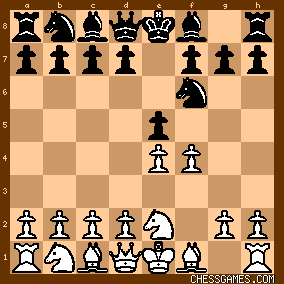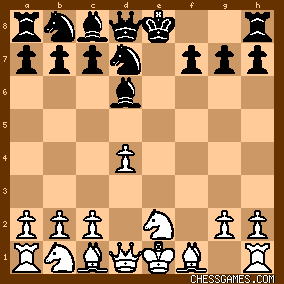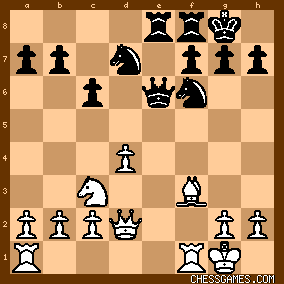| KEG: A game of little interest. Alapin was virtually assured of fifth place. His only chance of tying for fourth was if he won this game and also his replay against Blackburne while von Scheve lost his replay against Winawer. Since von Scheve did not lose, it was a certainty that Alapin would finish exactly fifth. Meanwhile, Mason was far out of the running. So small wonder the players played a quick draw. The only interest in the game was the handling of Alapin's patented opening. 1. e4 e5
2. Ne2

click for larger viewAlapin's Opening. By my count, he played it at least 24 times (including this game) in Tournament play. It is hardly a great theoretical line. But Alapin knew its ins and outs. 2... Nf6
2...Bc5 is another good response.
3. f4

click for larger viewAn Alapin favorite. For anyone else, 3. Nbc3 or 3. d4 are best. 3... Nxe4
4. d3 Nc5
4...Nd6 (and then 5. fxe5 Nf5) looks best. But the text was apparently played in every game in which the 3. f4 line was used. 5. fxe5 d6
Schwarz and Rubinstein here played 5...d5 against Alapin. The text looks simplest and best. 6. d4 Bcd7
7. exd6 Bxd6

click for larger view8. Bf4
Alapin was obviously looking for exchanges and wasn't worried that Mason would make an serious effort to avoid a draw. Otherwise, he would have considered the better 10. Nbc3 or 10. g3. 8... Nf6
8...0-0 or 8...Nb6 were the best ways for Black to play for an edge. 9. Nbc3 c6
Again avoiding any real effort to seek an edge, as he might still have done with 9...0-0 or 9...Nc6. 10. Qd2 Be6
11. BxB
Time to start trading off pieces. As a theoretical matter, the move is fine. But 11. 0-0-0 was the way to inject some life into the game. 11... QxB
12. Nf4 Nbd7
13. Be2
Alapin's lack of ambition is obvious. He could have played 13. 0-0-0 or 13. NxB had he any real interest in playing on, or if he thought Mason wanted to do anything other than agree to an early draw. 13... 0-0
14. NxB QxN
15. 0-0
15. 0-0-0 was obviously better, but the text allowed Mason a way to force the exchange of Queens. By this point, neither player seemed even remotely interested in trying to win or concerned that his opponent intended to do so. 15... Rae8
16. Bf3

click for larger view16... Qe3+
Mason might have gotten the (slightly better game with 16...Qd6 or 16...Nb6. But by this point the players seemingly had a tacit understanding as to the outcome: 17. QxQ RxQ
18. Rae1 Rfe8
19. RxR RxR
20. d5 cxd5
21. Rd1 Nb6
22. Nxd5 NbxN
23. BxN NxB
24. RxN Kf8
25. Rd4 Re6
26. Rd4 Re7
27. Rd8+ Re8
Draw
A result that clearly was entirely satisfactory for both players, especially since the game was short. They both had to come back the next day for another replay (though Mason wound up winning by default when Gunsberg chose not to appear. | 




